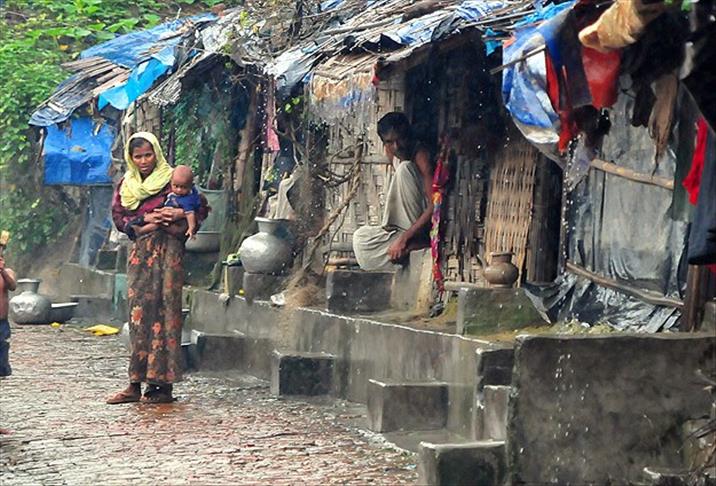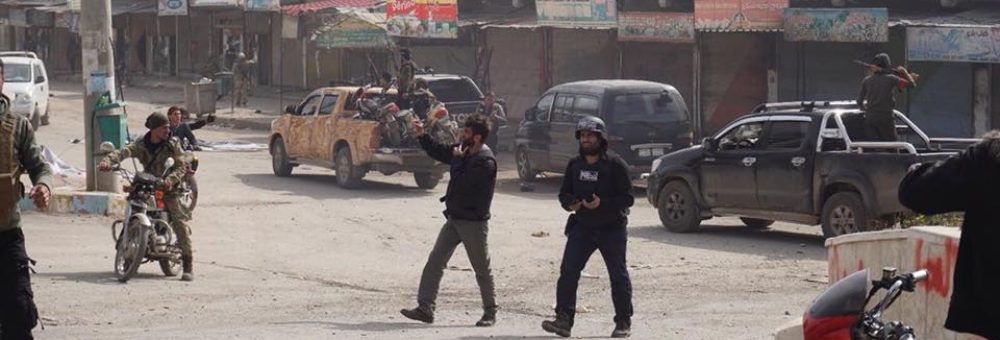Protests take place in UK against violence and arbitary arrests of Rohingya men and boys.

LONDON
At least 40 Rohingya Muslims are now believed to have been killed in last week’s violence in Myanmar, according to a human rights group Fortify Rights.
The group said that hundreds of Rohıngya Muslıms have been forcibly displaced and warned that the number of dead could be higher, but it was hard to gain information because of government restrictions.
According to AA sources, Rakhine authorities have been arresting male Rohingya over the age of ten, something confirmed by Fortify human rights group. Following the attacks last week a verbal order was issued on January 14 to riot police to indiscriminately arrest all male Rohingya, including children over the age of ten, in the areas surrounding Du Char Yar Tan village.
“These arbitrary detentions broaden the scope of the human rights violations in the area and should be immediately brought to an end,” said Matthew Smith, Executive Director of Fortify Rights.
The news comes as demonstrations took place in the UK outside the Myanmar – also referred to as Burma – embassy and the UK Foreign and Commonwealth office (FCO). Over 30 demonstrators gathered to vent their opposition to the Myanmar government’s policy towards the Rohingya Muslims, who are not considered Myanmar citizens. Outside the FCO the protestors called on the British government to live up to their international responsibility, stand up for human rights and for the UK military to stop training the Myanmar military.
The US and UK said in a joint statement: “We are saddened to hear reports that several people have been killed, many injured, at least one missing, and hundreds of civilians displaced in violence that included looting and destruction of homes and property in Du Chee Yar Tan village.
We are particularly disturbed by reports that security forces used excessive means and thus perpetrated some of the violence. We strongly condemn such acts of violence, which negatively impact all inhabitants of Rakhine State. We urge the authorities to thoroughly investigate and hold accountable those responsible for the violence, whether civilian or security personnel.”
Fortify Rights said that the Myanmar government should act immediately to stop attacks and abuses against the Rohingya Muslims. Fortify Rights also asked that access to the area should be granted to humanitarian organisations, independent observers and international media.
Matthew Smith said: “There needs to be accountability for this wave of horrific violence in Maungdaw Township but mass arrests of Muslim men and boys are not the way.”
This was something mirrored by protestors in London, they called for an international inquiry into what is happening in Rakhine state.
President of the Arakan Rohingya National Organisation, Nur ul Islam said: “We need an investigation into the killings”.
“We call on the UN to act on its responsibility to protect.
“Save us!” he pleaded.
Nur ul Islam said that what was happening to the Rohingya was ‘genocide’ and that Western powers needed to speak up and put pressure on Myanmar.
Tun Khin, President of the British Rohingya organisation said: “The Myanmar government is practicing genocide against the Rohingya population.” He also said that Rohingya properties had been looted and burnt down, something AA sources in Rakhine have confirmed.
The situation in Rakhine state is still tense, men and boys from the village that was attacked last week are still in hiding according to the rights group.
“What we’re seeing is a protracted pattern of atrocities inflicted upon Rohingya, in addition to abuses they’ve endured for decades,” Matthew Smith said. “The authorities in Naypyidaw and Rakhine State are unable or unwilling to put an end to the violence; an international investigation is long overdue,” he added.
After repeated attempts to contact the Myanmar embassy no response was received. However, on the Myanmar embassy website there was a document entitled, ‘Myanmar Government’s efforts for peace and stability and development in the Rakhine State”; the document refers to the Rakhine Buddhists but not the Rohingya Muslims, the Rohingya are referred to as ‘Bengali’, something the Rohingya reject as they have been in Myanmar for centuries.
With regards to allegations that the British military were training the Myanmar military, the FCO admitted that they had been working with the Myanmar military but said that it was not to ‘build any military capacity or capability’. The FCO said: “From 6-17 January 2014, the UK Defence Academy successfully delivered an educational course to 30 students drawn from government and the Burmese military with academic partners from Cranfield University.”
“This course aimed to develop the professionalism of the Burmese Armed Forces within a democratic framework,” they added.
The FCO said that they “believe in the importance of engaging the Burmese military to encourage them to support reforms in Burma. It is only through engagement with all actors, including the military, that we will see greater democracy in Burma.”
Since violence erupted in Rakhine State in June 2012, hundreds have been killed, at least 145,000 Rohıngya Muslims have been displaced, tens of thousands are in desperate need of humanitarian aid with similar numbers having fled the country. A year-and-a-half after initial violence, displaced Rohingya in Rakhine State still lack adequate shelter, drinking water, sanitation, and health care.
Rohingya Muslims are not recognised as Myanmar citizens under the 1982 Citizenship Law.
In 2013 the President of Myanmar, Thein Sein visited the UK on the first official visit of a Myanmar President to the UK.
Read the original article published in Anadolu Agency on 23 January 2014
